#abdicate adulthood
Explore tagged Tumblr posts
Note
that tweet Viv liked about Stolas having a life outside Via and it being fine for him to do so
obviously it's fine and healthy for Stolas to have a life of his own. I'd say that most parents should have lives of their own - it provides a healthy model for their child to emulate and avoids them getting too clingy and dependent on their child for emotional support when the child gets old enough to start trying to assert their independence. and it helps parents feel less alone and gives them a support network, something people of all ages need
the point is that life of Stolas' shouldn't come at Via's expense, which it very much has. if we assume she had an OK home life up to the age of 17 when the fallout happened (which is a stretch given how s2 Stella and Stolas don't at all seem like they'd be able to pretend for Via's sake given how self-centred they both are) that doesn't make it OK for Stolas to upend that life by cheating and neglecting her for his new obsession, Blitzo. then he supports her through all this turmoil that he caused by *checks notes* sexually harassing his affair partner right in front of her at a theme park she had no interest in going to, forgetting a promise he made to her while he was abusing his butler and calling her mother a bitch and not telling her they both might be in danger of assassination
and if fans want to play it like Via is legally an adult at 18 so Stolas' obligations are over, Stolas still had a responsibility to prepare her for adulthood and being his heir. which he obviously didn't since she apparently doesn't know magic and he was lending out the grimoire most of the month anyway. And if we assume he didn't want to have Via in the first place, he still chose to have her instead of abdicating. he could have run away if he didn't want a child of his own to care for.
that he didn't want it doesn't suddenly mean Via isn't a person who needs to be cared for.
more than that, though, Stolas could have been building a support system and life for himself while she was young. he wouldn't have to devote 100% of his time to raising Via, especially not when she was young enough to go to bed early. what was stopping him calling up friends on the phone or inviting people over? what was stopping him going out if Via was out shopping or busy on weekends? he has a phone, can teleport and has butlers like the one who raised him, it's not like he couldn't have been back in a blink for any problems that came up. are we just supposed to assume all of Hell prefers Stella even though she's supposed to be so terrible and bitchy so Stolas couldn't have made friends even if he tried? supposedly Vassago was one of the 'good ones' of the Goetia - he couldn't have been friends with him?
as it is it comes off like Via was following Stolas' example - she stays trapped in the palace most of the time, has no friends and would make a terrible heir because that's how Stolas is. he has no friends of his own and is terrible at both his jobs - magic and parenting. honestly it's super weird Via is a 17yr old and seemingly has no friends of her own before she met Loona. was she just isolated in the palace this whole time? even if she's royal she can still have security, though I guess if Stolas' invisible legions appeared onscreen fans would rightfully be asking why he keeps expecting Blitzo to bail him out all the time
Bingo.
Stolas can and should have a life outside of Via. The problem is that Stolas's life outside of Via is full of choices that actively harm Via, in addition to pretty much everyone else around him, including himself. The problem is that Stolas is a delusional manchild hellbent on getting his idea of a fairy tale romance, and it doesn't matter to him who has to suffer in the name of that.
48 notes
·
View notes
Photo

Fujiwara Clan
The Fujiwara Clan (Fujiwara-shi) was a powerful extended family group which dominated all areas of Japanese government during the Heian Period (794-1185). Founded by Fujiwara no Kamatari in 645 CE, male members held on to key official positions, many acting as regents to the emperor, and ensured their daughters married into the imperial line. By the 12th century CE, Fujiwara power declined as successive emperors abdicated in favour of their own chosen heir while still maintaining their hold on power in retirement. The Fujiwara were ultimately replaced by the rival Taira and Minamoto clans.
Fujiwara no Kamatari
In the 7th century CE the court official Nakatomi, later to become Fujiwara no Kamatari (614-669 CE), became a useful ally to Prince Naka no Oe, and together they staged a coup in 645 CE which deposed the powerful Soga clan who had hitherto dominated government positions and were threatening to usurp the power of the emperor. A series of political reforms were then initiated, known as the Taika Reforms (Taika No Kaishin). These reforms were based on the Chinese model of strong central government and they nationalised land, reorganised the court ranking system, forbade the ownership of unauthorised weapons, and attempted to root out corruption. When the Prince became Emperor Tenji (661-671), he gave Nakatomi and his descendants the surname Fujiwara and made him his special minister.
Kamatari's son Fubito (aka Fuhito, 659-720 CE) married the daughter of Emperor Mommu, and his four grandsons each formed the four branches of the Fujiwara clan: Nanke (Southern House), Hokke (Northern House), Shikike (Ceremonials House), and Kyoke (Capital House). The Fujiwara line was now firmly established and they would keep a tenacious grip on power as they not only dominated policy and government bodies such as the household treasury office (kurando-dokoro) and Council of State but also managed to marry off their daughters to emperors.
Further weakening the royal position was the fact that many emperors took the throne as children and so were governed by a regent (Sessho), usually a representative of the Fujiwara family. In total there would be 21 Fujiwara regents from 804 CE to 1238 CE. Even when the emperor reached adulthood, he was still advised by a new position, the Kampaku, which ensured the Fujiwara maintained their influence. To guarantee this situation was perpetuated new emperors were nominated not by birth but by their sponsors and encouraged or forced to abdicate when in their thirties in favour of a younger successor. Thus, for example, between 858 and 956 CE there were 10 different emperors. As a consequence, key Fujiwara members could act as regent to three or four successive emperors in their own lifetime.
Continue reading...
24 notes
·
View notes
Text
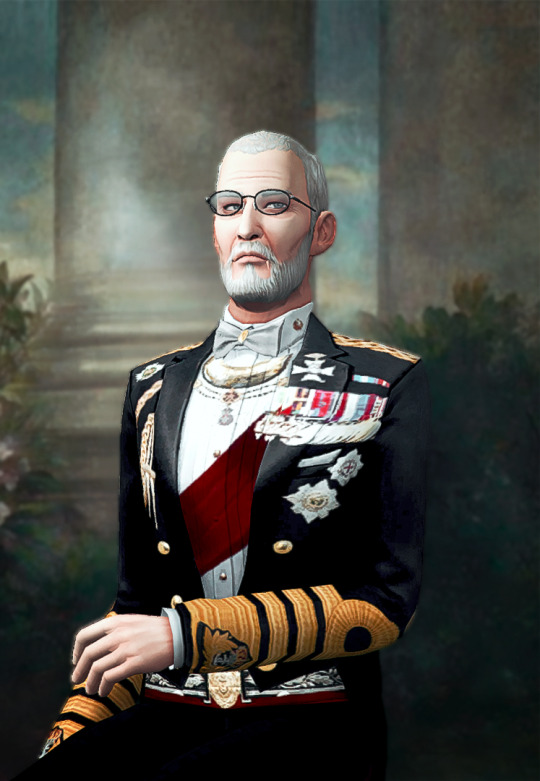
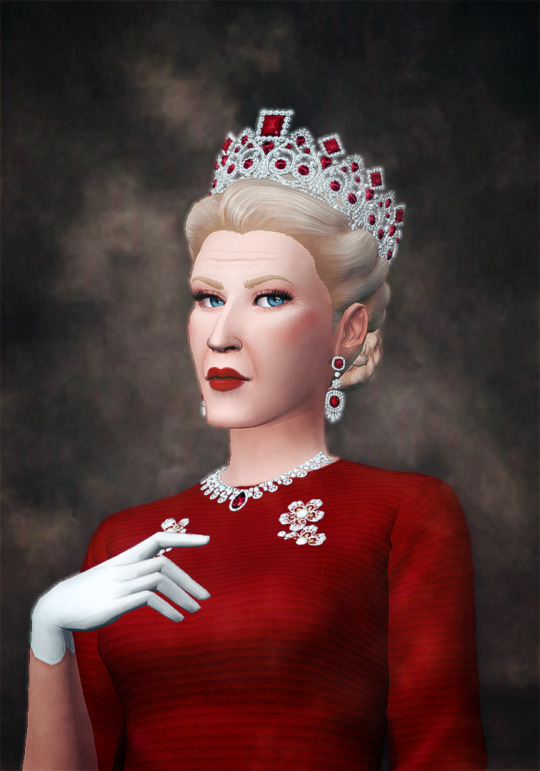
King Henry II, last royal portrait before his death in 1998
Born: 1915 - Died: 1998
Reign: 1932-1998
His wife, Queen Mother and Duchess of Sussex, Gwyneth
Born: 1938 - Still living
Married to King Henry II in 1958
He famously disliked sitting for portraits with her in the room.
Together their issue totaled 6 children, with only 3 of them surviving to adulthood-- Rosalinde, Duchess of Worcester (b.1960- ; abdicated, estranged from the royal family), Princess Anne (b.1967- ?), who went missing in 1992 and who has never been found, and King George X (b. 1969- ).
#LORE DROP TIME#c: george x#c: gwyneth#c: henry ii#c: anne the lost#c: rosalinde the estranged#I finally got the dates and stuff for the royal line going back to the 1600s#so the lore will be more consistent going forward lol
29 notes
·
View notes
Text
Trump’s Best Lies Weren’t Trump’s
By Holman W. Jenkins, Jr.
May 8, 2024
In an act of editorial cowardice, the Economist devotes a leading editorial plus an entire special section to the problem of disinformation yet never mentions the Steele dossier and Hunter Biden laptop lie.
Its package is timely for all the reasons I’ve written about: Disinformation is likely to flow in even greater abundance to influence the 2024 vote. But it also botches the most important insight. The anonymous AI-generated disinformation on the web that preoccupies the magazine’s editors is trivial in effect next to official disinformation from government sources circulated by mainstream media.
The Economist details a surreptitious Russian plot to blame America for dengue fever in Africa. It ignores a story of open disinformation of gobsmacking continuing influence, which has half of America watching as the other half (and most of our political class) lie about what happened after 2016. If the magazine thinks these voters aren’t drawing conclusions that will shape the 2024 outcome, it needs its medication adjusted.
Let’s step back: Political causes may be good or bad, but few or nonexistent are those campaigns or campaigners who have been unwilling to lie in their causes.
Eisenhower lied about the U-2 program in one of the best causes ever, keeping a check on Soviet ICBM development.
Sam Harris, the popular podcaster and neuroscientist, exhibited his essential adulthood when he recognized and approved the laptop lie because of the importance he attached to defeating Trump.
Knowing when you lied and why you lied is psychologically healthy. Do I think Leon Panetta, the longtime respected congressman and Obama CIA chief, is of healthy mind? Yes. He and colleagues saw that it would help Joe Biden to associate Hunter’s laptop with Russia and left unspoken between them that it was a lie.
The Economist, in contrast, gives us a blaring, billboard-like exhibition of the psychological disorder known as splitting. See if you recognize the pattern:
Splitting means claims and assertions hostile to Mr. Trump should be repeated and emphasized; any that aren’t should be suppressed.
The Steele dossier should be trumpeted until it stops being useful for discrediting Mr. Trump and starts to discredit his enemies—in which case it should never be mentioned again.
If a statement is true and favorable to Mr. Trump, the only motive for voicing it is pro-Trumpism. (This will create problems for weather reporters if Mr. Trump says it’s raining and it’s actually raining.)
Russian meddling can’t both have happened and have been trivial—because the first part sounds anti-Trump but the second doesn’t. This is unacceptable to the splitting mind.
I know it would be unthinkable at this late date for our media and political elites to come clean. It would amount to abdicating the election to Mr. Trump.
Telling the truth, unfortunately, needed to start long ago before it could change the moment we’ve reached today.
And yet the perverse consequences ought to be beating us over the head. As David Brooks of the New York Times tweeted after Mr. Trump won 11 million more votes in 2020 than he did in 2016: “Our job in the media is to capture reality so that when reality voices itself, like last night, people aren’t surprised. Pretty massive failure.”
In 2015 Donald Trump was a noisy celebrity ranting about illegal immigration. Nine years later, he and his legions have an epic narrative to tell themselves, true in many particulars, about the U.S. government and media thwarting them with lies and fabricated evidence.
Most of all, in bold letters, our current fix should recall the wisdom of the media’s former motto: “Without fear or favor.” Or as Walter Lippmann put it a century ago, “In his professional activity it is no business of [the reporter’s] to care whose ox is gored.”
We tell the truth and let the chips fall because we don’t know where the chips will finally land even if we think we do. Moreover, once we allow ourselves to start lying to the public for its own good, inevitably our reasons for doing so become more corrupt and self-seeking over time. Whatever his demerits, the press now paints Mr. Trump in impossibly lurid colors to justify its past behavior. Witness also the “Trump bump” in paid subscriptions and TV ratings. Lying about Mr. Trump works commercially for media owners even as it benefits Mr. Trump too. In fact, nothing has been more profitable, even salvational, for many mainstream media companies than MAGA.
But the ultimate exploiter is Joe Biden, cynically using Mr. Trump’s antichrist image as a lever to shove his unwanted self down his own party’s throat despite age and poor polls.
If Mr. Trump now wins—he would only have to draw a middling hand in November—the recriminations against Mr. Biden deservedly will be scalding and eviscerating. The blame game might wreck the Democratic Party for a generation.
27 notes
·
View notes
Text
Witches in Utena are extremely elusive figures, contrasted and scapegoated by the 'Prince'.
By context, all of the Black Rose Duelists (except for maybe Mikage*?) are witches, existing only in relation as the shadows of their princes. Of course, by the nature of duelists, they are also princes, though noticeably more pitiable and weaker than the student council. Ms. Himemiya, the notable witch herself, is at her most active, vindictive, and empathetic during this arc, helping push and break the other black rose duelists.
Kozue and Shiori are notable even within this array, having a strong presence in the first and third set of duels, and notable for having 'enchanted' their princes through manipulation, leading to an easy understanding of their 'witchiness' in the fandom and the audience. But having done so successfully, they become immortalized as their princes' princesses, who are unwilling to scapegoat the girls. Is this a victory? In the 3rd set of duels the pair return as Rose Brides, having established a solid foothold within the realm of women, either by maintaining an indispensable job (Kozue as Miki's adult counterpart, a bride), or by subsuming her entire character into getting a noble prince to take her (Shiori in her relationship with Ruka, a princess, loyal and bitter to the end).
The other notable witch in the cast is Nanami, Kiryuu Touga's younger sister, and known darling terror of the school. Her abrasive and cold-faced attitude easily places her as the antagonistic jealous counterpart to Himemiya, but this abrasiveness is shortly subsumed. Touga makes Nanami a duelist, and soon after abdicates his responsibilities, leaving Nanami as the Student Council President Pro Tempore for the rest of the series (or until Nanami's last duel - it is her decision, Touga never returns, and the Student Council is never disbanded). Until said last duel, Nanami joins Miki and Juri in the maintenance of the student council theater, theatrically musing on the stabbings and workings of the arena. It takes the events of "Her Tragedy" and "The Romance of the Dancing Girls" to shake her out of her cyclical anxieties, as the growing pains of adulthood snap the idling dreams of princes into perspective; Nanami is Touga's witch, his excuse, shadow, and scapegoat - the thing he uses to keep the other girls at bay, the thing that will never be respected or loved in its anger. The reprieve of a witches power, adult intimidation and sensuality, is only cold misunderstanding to her peers.
Himemiya is Akio's witch, the younger sister he uses to terrorize his fiancee and students, who is terrorized in turn by everyone else in the school.
In lieu of his now-implied-dead fiancee, Akio has no qualms turning Anthy and Utena against each other, functionally leaving them as each others witches. The victory of one is the disappearence of another, and so on.
Though disappearing is its own sort of victory, anyways.
*Mikage is technically Utena's shadow, being the negative chosen one, but due to the nature of princes, he maintains his position by 'Princessing' Utena/Tokiko/Mamiya and scapegoating the other researchers (the ghosts of Nemuro Memorial Hall). The closest Utena has to a proper black rose counter part are Anthy/Tatsuya/Wakaba, who face the emptiness of her idealism.
24 notes
·
View notes
Note
Do you have a favorite chaotic historical person?
Christina of Sweden. Christina of Sweden often gets brought up as a queer icon, and sometimes specifically as a lesbian icon, and queer probably, but lesbian? No. We don't know about women, but Christina did like men. A certain type of man. A certain type of man which could not be found in Sweden.
Christina was the king of Sweden from 1632 to 1654, having come to the throne as a young child. Christina dressed in typical male dress from adulthood until abdication. This abdication was a result of Christina's conversion to Roman Catholicism and to a lesser extent, to Christina's distaste for the prospect of marrying. This conversion, as well as Christina's patronage as king of artists and intellectuals, made Christina the darling of the Counter-Reformation.
So what did Christina do upon abdication? Why, Christina moved to Rome started wearing extremely low cut bodices, and sleeping with Cardinals, of course. The pope repremanded Christina repeatedly for salacious dress and seducing Cardinals.
11 notes
·
View notes
Note
Truck or treat!! 🧛♀️🍫
sorry it took so long! there was the mexico gp and then i had a day-long existentional crisis!
i am not sure itsl ch.6 will be here soon as my professional future is currently at stake so have a snippet of its beginning in case i succumb to the abysses of adulthood and corporatism <3
warning (light) nsfw under the cut
He breathes heavily, tries to curl his fingers the way he usually likes, and arches tightly against his wrist. It’s good, but it’s not enough. Another whimper fills the room. It’s more desperate. Bordering on sadness. Sore remorse tugs at his larynx, sharp, cut-throat. He runs the same scenario over and over in his head. Oscar bringing him home after the event. Oscar kissing him against the door. Change of plot. Cinematic overtake. Carlos never closing the door on him. Them calling it a draw. The satisfaction of abdication. They remove fabric until bareness, until their limbs collide, until they’re one melted fusion.
#asks#itsl#carcar#just spent two hours crying to my mom#life is too cruel to hot girls#also you writing truck#points and laughs (affectionate)#thank you for making me smile through these tiring times#cele writes
18 notes
·
View notes
Text
lately i've been thinking about how the emotional strain of parentification kneecaps you from looking to your older parent as any kind of source of wisdom/advice. partially because they never were that for you due to the way they reversed that parent/child relationship. partially because they abdicate that role a lot of the time. but also like. even when they might actually have some wisdom to offer by the time you're well into adulthood it's really hard to change that dynamic and how you look at *them* too. as if they might have something to offer from their experience.
10 notes
·
View notes
Note
I really like and agree with your perspective in the post where you talk about other people’s vs fandom’s view of Henry and Alex’s positions. I think that their ages in the book vs movie are at play too. Personally I liked that the movie aged them up, but that takes away from the fact that their ages in there book put them right at the place between childhood and adulthood; right at the moment when they wouldn’t be able to claim childhood innocence anymore if they’re charged with complicity in the institutions they’re part of. That’s a key part of the book that the movie unfortunately doesn’t engage with: Part of choosing each other is also choosing to reject the power imbalances they’ve been raised to inherit.
thank you! i think the movie is also just not as in depth because it's a different format. i prefer them being older because i've gotten older since i read the book, but i do think you're right - however it's never too late to choose these things or to see things differently. honestly, i love when these things happen "later" in life tbh. i'm sure that if/when we get a sequel it'll be more focused on alex becoming disenchanted with politics/focusing on law and henry abdicating the throne, which is what the movie was most lacking imo and honestly the only way they really can go in this political climate, i think. but even that aside, people talked about the book that way before the movie even existed, and honestly a lot of people STILL see the book as propaganda based on the title/cover while not actually reading it.
#reply#i don't really seperate the book and the movie in terms of feelings etc#i just assume it happened off screen lol#but i more meant people who just second hand absorb it and haven't read OR watched it#and i GENUINELY think there will be a bonus chapter type sequel
14 notes
·
View notes
Text
Hello hello everyone I'm back at it again at Krispy Kreme- I mean my Mariolore AU silliness and I have with me today the Lineage of the Queens of the Mushroom Kingdom. The line of Queens will range from Dove all the way into the future/modern era to the princess that will one day become Queen. Without further ado let us begin with Queen Dove herself :3

Queen Dove was indeed "Beloved by the Realm" as her gentle spirit had managed to tame her husband King Boo known as the "Tyrant King". Dove was also a devoted mother to her and Boo's two children Theresa and Haru, and a loving wife for many years up until King Boo's death. After her husband died, the Queen continued to rule over the Mushroom Kingdom for 3 more years until she abdicated the throne to her oldest child and only daughter Theresa, retiring and becoming the Dowager Queen as she moved into the Summer Castle to live out the rest of her life...
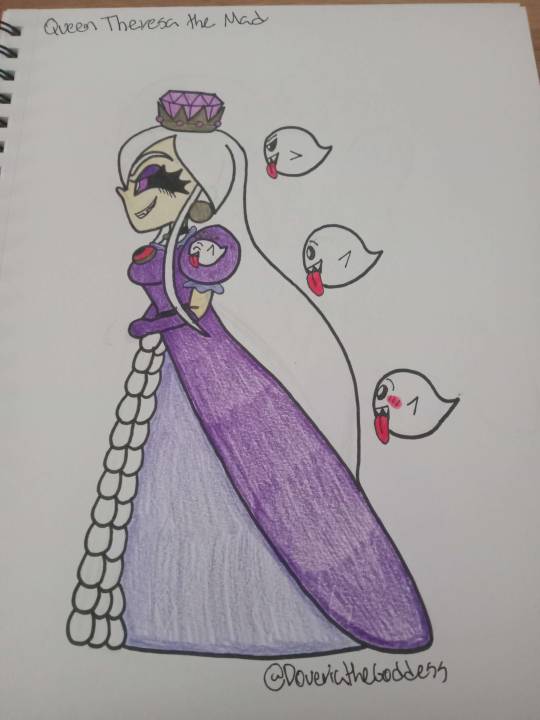
Queen Theresa the Mad ascended to the throne at 21 years old when her mother Queen Dove abdicated the throne to her. The first few years of her reign were peaceful until Theresa eventually suffered from a mental breakdown due to a build up of paranoia, believing that her younger brother Haru was planning to take her throne for himself, which caused her to start attacking some of the other kingdoms in the region. Eventually she did get overthrown by Haru who used the power of the Seven Stars to seal her away into a painting, but not before she used the last of her dark magic to place a curse on her brother and his bloodline, uttering the words "No more sons shall inherit the throne forevermore..."
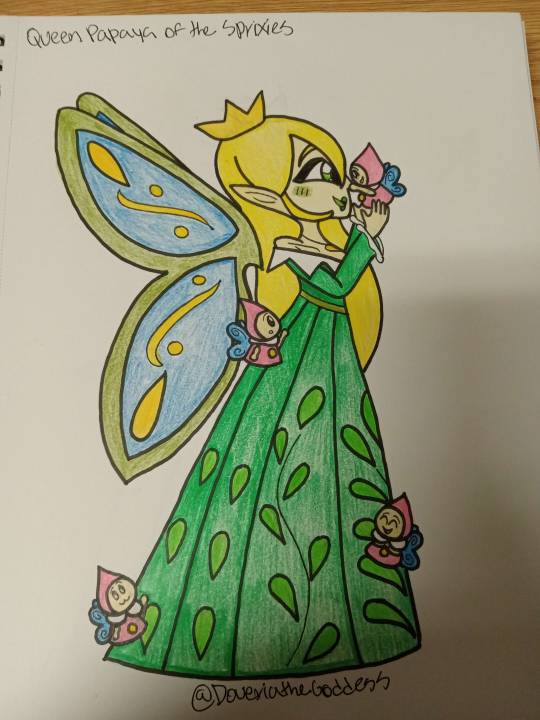
Queen Papaya of the Sprixies was the daughter of Queen Green Sprixie, and when Prince Haru of the Mushroom Kingdom arrived at her home to seek asylum after Queen Theresa's failed attempt to kill him, she convinced her mother to let him stay. During the time the prince stayed at the Sprixie Kingdom, he and Papaya fell in love before Haru eventually set off to take back the Mushroom Kingdom once his older sister started getting out of control with her destruction. After the war ended and Haru was crowned King, Papaya and her Sprixie servants left the Sprixie Kingdom and used their magic to restore the region back to life when it was on the brink of ruin. As soon as she reunited with the newly crowned King of the Mushroom Kingdom, Haru asked her to marry him and become his Queen, to which she accepted. Their marriage would unite the Mushroom and Sprixie Kingdoms together, and during her reign as Queen, Papaya oversaw that the Sprixies had a good relationship with the Toads and Humans of the Mushroom Kingdom...
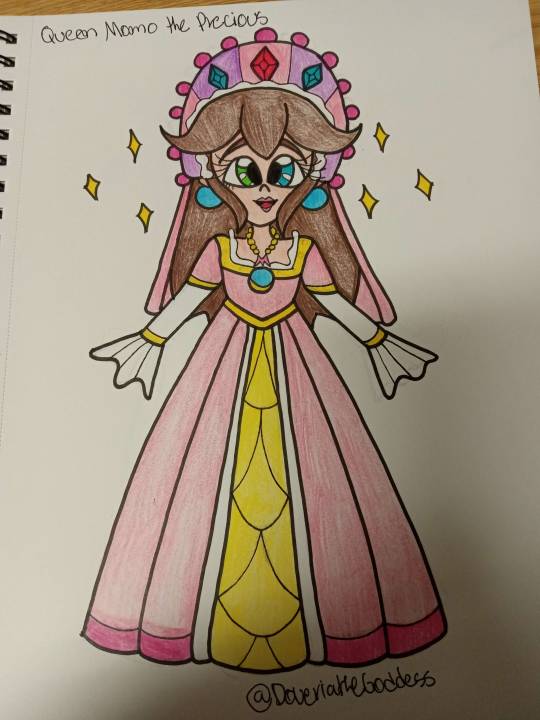
Queen Momo the Precious would be the first Queen to start the lineage of female monarchs, as she was the daughter of King Haru and Queen Papaya. As a child Momo learned how to dance and her love for dancing grew with her into adulthood, and even as Queen she continued to dance at festivals, parties, and other events. Momo adored her subjects just as much as they loved her, and her reign over the Mushroom Kingdom would be known as a Golden Age. Under Momo's rule, peace, prosperity, and the people all flourished in the Mushroom Kingdom...
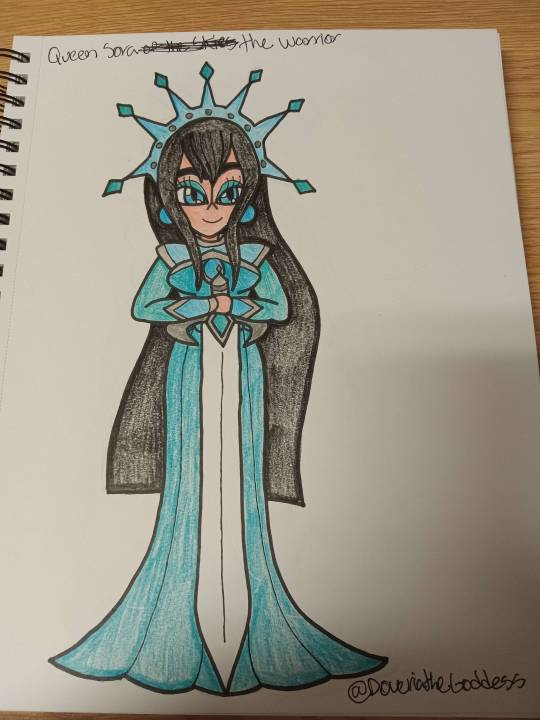
Queen Sora the Warrior was the daughter of Queen Momo and feared by those who dared to threaten the Mushroom Kingdom. As a young child she watched her father train the knights and guards that defended her home, and after many pleas to join her father decided to let her train as a knight. Even after many years of training Sora would still continue to spar with the knights as Queen, and soon her skills were put to the test when a rouge faction of Koopas started attacking the Mushroom Kingdom due to a disagreement over territory. Enemies would flee upon seeing the massive sword Sora carried with her, and during the battle that becoming the turning point only one Koopa mage was brave enough to try to defeat the Warrior Queen, but fate had their plans as during their fight Queen Sora and the Koopa Mage fell in love. And from their love the Queen and the Mage combined their swordsmanship and magic to end the fighting once and for all...
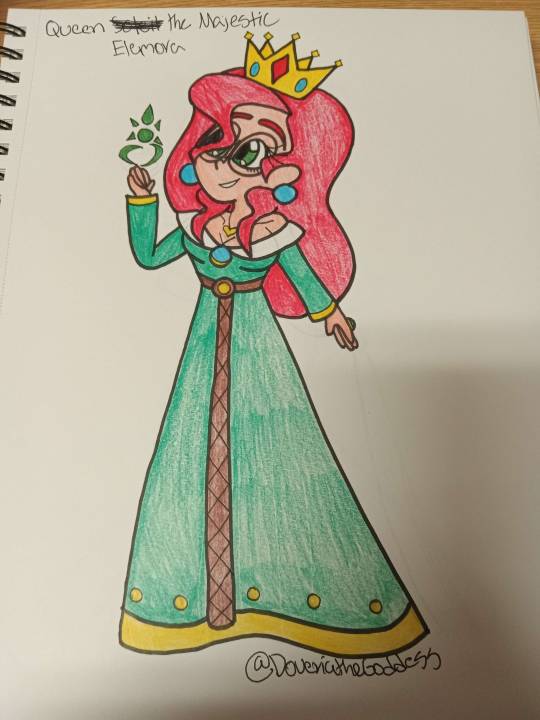
Queen Elemora the Majestic was the half human half koopa daughter born from the union of her parents, her mother being Queen Sora and her father a Koopa Mage. Elemora proved to be her father's daughter as she inherited his koopa magic, and just like her mother learned how to be a warrior from her father, Elemora learned from her father on how to use her koopa magic. When the half koopa queen was crowned, she wasted no time in making sure that the relationship between the Mushroom and Koopa Kingdom was restored to its greatness as the previous war had caused it to deteriorate. Even though majority saw Elemora as a human, there would be times when those unlucky enough would bear witness to her koopa side...
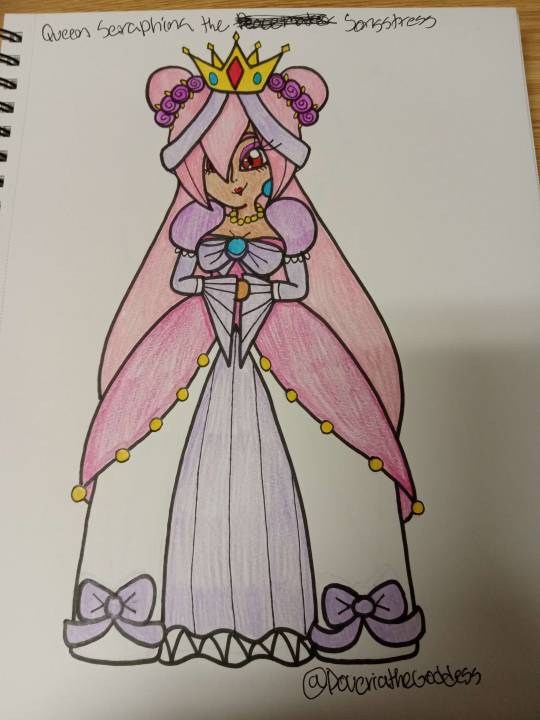
Queen Seraphina the Songstress was the daughter of Queen Elemora, and just like the title she held Seraphina's singing was the most beautiful thing that the Mushroom Kingdom and the entire region could hear for thousands of miles. As her singing started as a child, Seraphina would continue to carry a tune into her adulthood and when she became Queen she sought to utilize her voice to the fullest extent. Seraphina would then oversee the building of the Sparkle Theater as one of her first acts of Queen, and once it opened many came far and war to see the Queen of the Mushroom Kingdom perform as the first Opera Singer in the Sparkle Theater. After performing many solo acts, she eventually began to perform duets with her husband, a Luma being who was banished after he began to become more human...
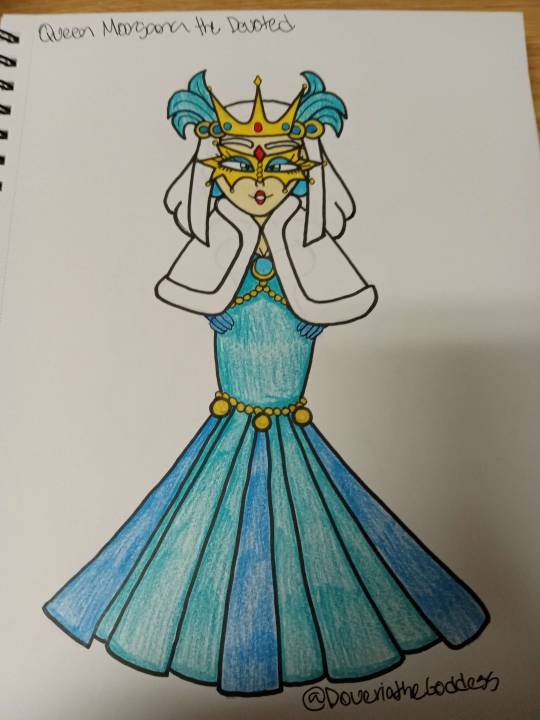
Queen Morgana the Devoted is the daughter of Queen Seraphina, and since she was a teenager Morgana loved being social with everyone she came across. The young queen's marriage to a newly promoted captain boosted morale for the citizens, as the his business in trading overseas flourished which led to the economy of the Mushroom Kingdom being nearly restored to it's former glory. But tragedy would strike as shortly after the couple's daughter was born, a dangerous storm had struck the king's ship while he was out at sea, and the captain went down with his ship after making sure his crew had safely made it out. Queen Morgana would grieve over the loss of her beloved husband along with the Mushroom Kingdom, and she would make sure that she put her young infant daughter who needed her the most first above all else. As her daughter grew into a child, Morgana began a relationship with a Koopa diplomat who had been friends with her late husband, and eventually the two of them wed. When her daughter grew older and married her own husband, Morgana abdicated the throne to her and retired to the Summer Castle as the Dowager Queen with her second husband. The Dowager Queen and her current husband still reside in the Summer Castle, as they grow older together...
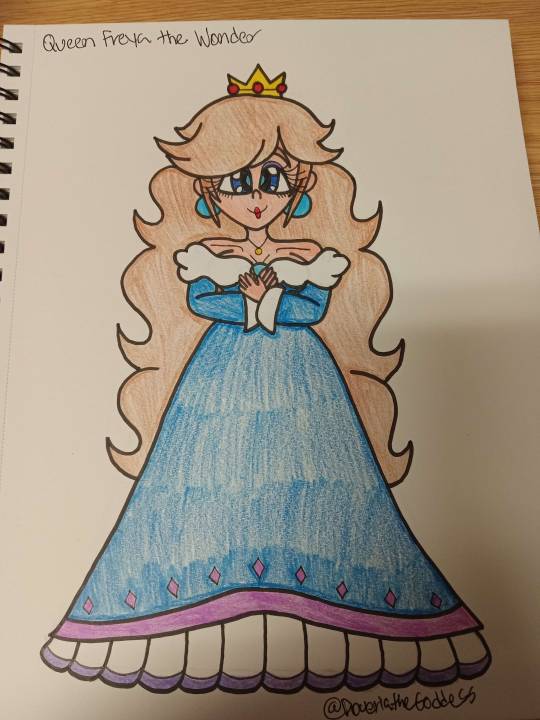
Queen Freya the Wonder is the daughter of Queen Morgana and the current ruler of the Mushroom Kingdom as we enter the modern era. As fate would have it, Freya happened to posses the powers of the Oracle and this meant that she was also the new Queen of the Celestial Kingdom, causing for the island that had been neutral for centuries to now become allied with the Mushroom Kingdom. With Freya's powers as an Oracle proving to be the strongest out of all previous rulers of the Celestial Kingdom, the Seven Stars themselves descended onto the Mushroom Kingdom so they could teach the young "Queen of Queens" on how to use her powers to better the world itself. Queen Freya continues to rule over the Mushroom Kingdom and uses her powers to protect it along with the other kingdoms...
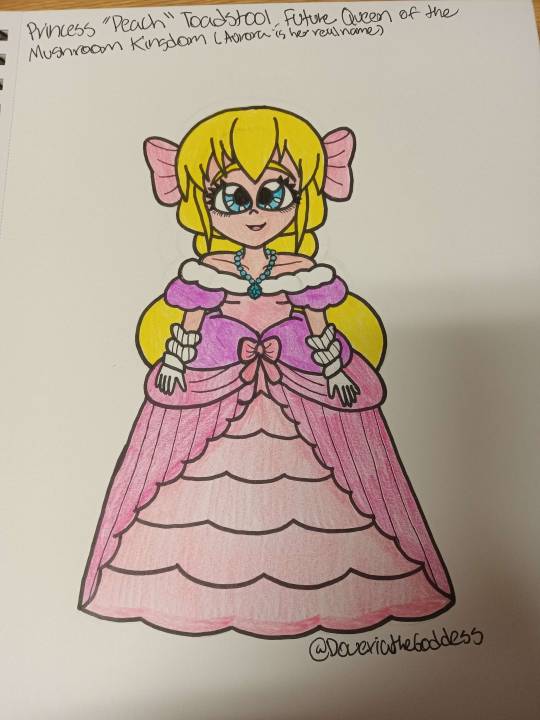
Princess Aurora "Peach" Toadstool is the young 14 year old daughter of Queen Freya, and is an eager little princess that has a heart for animals and adventure. She still has a lot to learn on what it truly means to be a Queen of the Mushroom Kingdom, but nonetheless she continues to grow everyday and run around the castle she calls home under the watchful eyes of her parents and the castle staff...
And that concludes the Lineage of the Queens of the Mushroom Kingdom! To wrap it all up I also have a family tree that I created so it can help everyone remember who's the daughter of who. It also includes the names of the kings that the queens married :D (If you guys are having trouble reading my handwriting in some certain areas then just let me know and I can type it out so it's easier-)
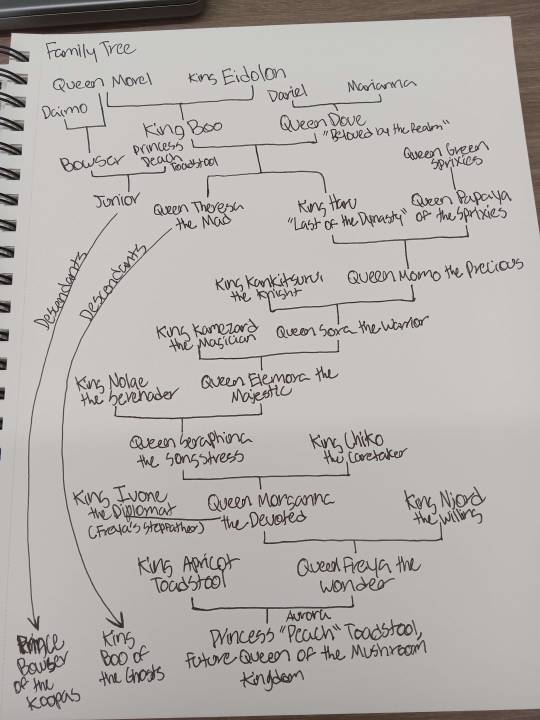
I love trees <3
#mariolore#mariolore au#queen dove#queen theresa#queen papaya#queen momo#queen sora#queen elemora#queen seraphina#queen morgana#dowager queen morgana#queen freya#princess aurora “peach” toadstool#there's a lot of reading#I might have gotten a bit carried away in my ramblings-#anyways#I hope you guys like it :3
9 notes
·
View notes
Text
James I (and VI) & George Villiers
Continuing my series of learning about things referenced in the book, I'm looking at things referenced in Alex & Henry's visit to the V&A Museum. These are all tagged #a series of learning about things that are referenced in the book, if you want to block the tag.

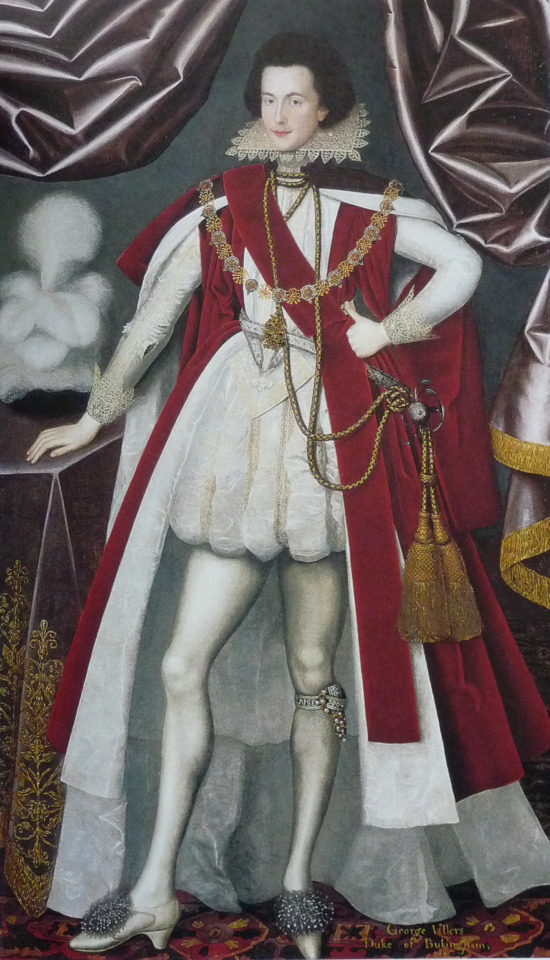
"Actually . . . you remember how I told you about the gay king, James I?” “The one with the dumb jock boyfriend?” “Yes, that one. Well, his most beloved favorite was a man named George Villiers. [...] He stood in front of the Privy Council and said, ‘Christ had John, and I have George.’" -Chapter 10, Red White & Royal Blue
-----
King James I (in England, in Scotland he was James VI) ruled from 1567 (Scotland) and 1603 (England & Ireland) until his death in 1625. He was the son of Mary, Queen of Scots, and was crowned King of Scotland aged 13 months - after her forced abdication. He gained full control of government in 1583, and 6 years later married Anne of Denmark - they had seven children, but only three survived to adulthood, with one dying aged 18. Then-Queen of England, Elizabeth I, died childless in 1603 and James VI of Scotland was passed the crown of England without protest.
George Villiers, the 1st Duke of Buckingham, was born in 1592, to a minor gentleman, Sir George Villiers. Aged 21, he caught the eye of King James I and gained the King's patronage. He was described as "the handsomest-bodied in England", and also gained the support of the King's wife, Anna. Villiers was made a gentleman of the bedchamber - whose duties involved assisting the King as he dressed and ate, and also to provide companionship - in 1615, and in 1623 he was elevated to a dukedom, the first commoner in more than a century to be granted this.
Their relationship was the subject of rumours at the time, with many assuming they were sharing a bed. As Henry mentions in the same scene as the quote at the top, 17th century poet de Viau wrote "it is well known that the king of England / fucks the Duke of Buckingham." King James' nickname for Villiers was "Steenie", after Saint Stephen - who was described as having "the face of an angel".
The full quote preceding "Christ had John, and I have George" adds to the display of the depth of the king's feelings for Villiers. He said in 1617 before the Privy Council: "You may be sure that I love the Earl of Buckingham more than anyone else, and more than you who are here assembled. I wish to speak in my own behalf and not to have it thought to be a defect, for Jesus Christ did the same, and therefore I cannot be blamed. Christ had John, and I have George."
Sources/Additional Reading: Wikipedia - James I & VI Wikipedia - George Villiers Wikipedia - Succession to Elizabeth I Wikipedia - Union of the Crowns BHO - The bedchamber: Gentlemen of the Bedchamber Wikipedia - Personal Relationships of James I & VI The History Vault - James I & VI and his male ‘favourites’
#rwrb#red white and royal blue#rwrb movie#alt text added#elio's#elio's meta#long post#a series of learning about things that are referenced in the book
35 notes
·
View notes
Text
Young Royals Perfectly Understands Frustrating Teenagers
*Spoiler Alert for the whole series*
This Netflix-produced Swedish teen drama just wrapped up its third and final season. It follows the second-in-line to the Swedish throne, Wilhelm “Willie” navigating a fancy boarding school rife with toxic social hierarchies and a crippling addiction to dangerous traditions, while also discovering his sexuality. Suddenly, his older brother dies and he’s now the crown prince, when no one ever expected him to have this responsibility, including himself. His jerk of a cousin records him and his new secret boyfriend being intimate and so ensues three seasons of drama surrounding the chaos of this poor kid being outed to the whole world, and the damage of publicity on his relationships.
*I watched this with subtitles and cannot comment on the quality of any dub.
This show is incredibly frustrating, because its characters are frustrating—because they’re incredibly believably teenagers who stake their entire futures on a high school fling. Willie and his love interest, Simon, are in a constant struggle over Willie’s great expectations as the new crown prince and Simon, of a lower social class, having a great many demands over how he thinks he should be able to live his life.
The characters have a ton of depth and that goes well beyond the two leads. The villain of the show, August, the evil cousin, is a hot mess who can’t do anything right. One that absolutely expects to peak in high school and sail through adulthood on his family’s legacy. He’s also Willie’s spare if he abdicates the throne, a rather unique twist on the prince trope I haven’t seen very often. Willie doesn’t want to be king, but he hates the idea of August on the throne even more, and, if only to spite his cousin, strays way outside of his comfort zone and ignores his own wants and desires to make sure he becomes king.
Other side characters include the dudebro boys of their school, also all dickish aristocrats, the ladies’ side of the school, and Simon’s sister's relationship with these socialites and her awesome best friend, Felice.
—
*spoiler alert again*
These two characters, Willie and Simon, are terrible for each other. Simon is too young and immature to understand and appreciate the demands of being royalty in a modern setting. He gets upset at Willie for all manner of things—that Simon has to watch what he posts on social media, who he talks to, who he takes pictures with, what statements he makes, and his unrealistic expectations of any politician. Every time he gets upset, I understand that he’s 17, but I’m also scowling at my TV thinking, “What exactly did you expect, dating royalty?”
Willie, on the other hand, bends over backwards for this guy and desperately needs to actually attend his therapy sessions instead of angsting over his doomed-to-fail romance. They’re entertaining, but they are so, so stressful to watch, whether it’s their many arguments or whenever they start making out in a public place where they can be caught.
They break up, get back together, break up, get back together. In the 11th hour of season 3, Simon officially breaks it off and I actually cheered. I figured the finale would end with the sick queen’s funeral and Willie reluctantly accepting his birthright.
That did not happen. Instead, Willie and August have a rushed “all’s forgiven” conversation, he abdicates, and runs after Simon to be free of a responsibility he never wanted. On the one hand, yes, he never wanted to be king, that much was clear from the moment he found out he was the new crown prince, but on the other hand—Willie wasn’t the character who needed to change for this relationship to work.
Simon was.
Simon, who argued with him constantly over the conservative nature of the monarchy, for all the stances Willie wasn’t allowed to take because of his rank. Simon could have ended this season either breaking up with him for good, or committing to the responsibility of loving royalty, and the two could have looked to a future of slew of progressive changes once Willie had the authority to enact change as king.
August won’t enact shit. August who, upon telling his friends that he’s the new second-in-line, realizes acutely how miserable he’s about to be for the long rest of his life. I half expected this guy to not survive to the end of the season with how self-destructive he is.
It feels like they had a different direction planned for the finale and someone somewhere cut it down. That, or Netflix's "3 season" rule made no exceptions and they had to rush to the finish line.
—
Overall, they’re frustrating, but they’re also incredibly well-written teenagers. The constant pop/club music over actual score got annoying but it’s an exposure to artists I never listen to. The acting is fantastic across the board, as well, along with the editing and cinematography. The actual plot, up to the finale, was engaging and well thought out, with these two heirs duking it out in a cold war with the entire school caught in the middle.
Maybe I just don’t understand Swedish teenagers. I certainly can’t speak to if this at all reflects the reality of Swedish culture and living under a monarchy. It’s a shame that, in my opinion, it didn’t quite stick the landing with the messages it wanted to send, but the show’s a solid, if stressful watch, and a short one at that.
8 notes
·
View notes
Photo

Insei: Cloistered Government in Ancient Japan
Insei or 'cloistered government' describes the strategy of emperors during the late Heian Period (794-1185 CE) in ancient Japan where they abdicated in favour of a chosen heir yet still ruled in some capacity, typically after retiring to a Buddhist monastery, hence the reference to a cloister. The emperors took such measures to guard against themselves and their successor being dominated by the powerful ruling families of the period, especially members of the Fujiwara clan, who sought to place their own supporters on the imperial throne. Although successfully employed by several emperors, two of the unfortunate consequences of the strategy were that the provinces became more remote from government control and the rivalries for power in Japan heightened to such a degree that a greater militarisation of politics eventually led to a complete overthrow of government and long-lasting rule by the shoguns in the medieval period.
Fujiwara Control
During the Heian Period in ancient Japan, government came to be dominated by one extended family clan in particular, the Fujiwara. They managed to monopolise key government positions, marry their daughters to emperors, and in many cases even act as regents and directly control the affairs of state. The Fujiwara were able to usurp the power of the emperor and reduce him to a mere figurehead, not only because they were backed by a powerful private militia when the royal household had no such army to fall back on but also because the Fujiwara purposely selected new emperors while they were still children. Thus the young emperor had to be advised by a regent (Sessho) who was almost always a representative of the Fujiwara family. In total there would be 21 Fujiwara Regents from 804 CE to 1238 CE.
Even when an emperor reached adulthood, he was still advised by a newly created position, the Kampaku, which ensured the Fujiwara maintained their grip on power. To guarantee this situation was perpetuated, new emperors were nominated not by birth but by their sponsors and encouraged or forced to abdicate when in their thirties in favour of a younger successor. Any adult emperor who proved too uncooperative was either forced to abdicate or conveniently removed, sometimes in mysterious circumstances. Thus, for example, between 858 and 956 CE there were 10 different emperors. As a consequence, key Fujiwara members could act as regent to three or four successive emperors in their own lifetime. One such figure was Fujiwara no Yoshifusa (804-872 CE) who was the clan leader (uji nochoja) from 858 CE. He put his seven-year-old grandson on the throne in 858 CE and then formally became his regent in 866 CE. This was the first time a regent had not been of royal blood, and it established a trend that would continue into the 11th century CE.
Continue reading...
17 notes
·
View notes
Text
Empty Vessel-'verse headcanons: Tilda
Thank you to @tildabardsdotter11 for asking me to do headcanons for Tilda in My Heart is an Empty Vessel-'verse! Here are the ones I can think of, and I'll reblog with more if I think of them!
She is endlessly curious, and not at all afraid to ask awkward questions; she is very direct, which can sometimes come across as tactlessness.
Her weapons-grade cuteness (as a child) develops into a disarming charm and openness that means she has most people she meets wrapped firmly around her little finger in five minutes flat.
She becomes a keen gardener in Dale, restoring its gardens and orchards and seeking advice, tips and plants from every ambassador who visits; her hothouses, in later years, are the envy of half of Middle-Earth.
She also becomes a healer, learning how to use the herbs and medicinal plants she grows; she is particularly skilled in midwifery. Her mother died giving birth to her and Tilda is named for her - her mother was Maud, known as Maudie, and Matilda is another form of Maud (in our world, Matilda is the Latin and Maud the Old English form of the name) - and Tilda decides early on in Dale that she wants to learn to help women in childbirth in her mother’s honour, so that as few women as possible suffer the fate her mother did.
In adulthood she is very enthusiastically pansexual, and is forever getting into one sort of mischief or another.
This fact notwithstanding, she is an accomplished diplomat and is very good at dealing with foreign ambassadors, most of whom want to arrange a marriage between Sigrid (who is Queen in this ‘verse, Bard having abdicated to retire to the Woodland Realm with Thranduil as soon as Sigrid was old enough to take over from him, and who is very very aroace) and their own ruler; Sigrid calmly ignores the marriage proposals, and Tilda tends to deal with the ambassador in her own way.
Tilda is the one who breaks the ice with Thranduil, initially, and although he does not have favourites among his stepchildren, if he did his favourite would probably be Tilda. They absolutely adore each other, and Tilda is the one who can disarm him and persuade him into doing things that will be good for him.
She is an inveterate matchmaker, and if she sees people being daft about each other and not doing anything about it, she will absolutely be the one who says something about it; she is almost entirely singlehandedly responsible for Bain and his childhood friend Lotta sorting themselves out and getting married, for starters.
She never marries (she is far too busy and also she doesn’t want to limit herself) but she has her family around her and she is probably the happiest of all of them to the end of her days.
If you’re in Dale and you have a problem, Tilda is the one you go to. She will know what to do, whether it’s referring you to Sigrid (and probably putting a word in on your behalf), brewing you a tincture, taking you for a walk in the gardens and a good long talk, whatever you need.
#lotr#the hobbit#the hobbit fanfiction#the hobbit fanfic#tilda#my heart is an empty vessel#empty vessel-'verse headcanons#my writing
10 notes
·
View notes
Text
Coronation
Series: None, this is a one-shot and you can find those here.
Fandom: The Royal Romance
Pairing: this is really about the sibling relationship, see author's note below
Rating: G
Warnings for this chapter: none
Word Count: 593
A/N: This is a short one-shot for the spring holiday event at @choicesholidays. Holiday: National Sibling Day, which was on April 10th. I wanted to rewrite coronation night from the perspective of the people who had the trajectory of their lives changed, either by abdicating or by being the one to step up. And I wanted to show the strength of the sibling relationship through that. With that in mind, this is an AU in which the scandal never happens because I want the focus of this piece to be on the coronation itself and not on someone getting dragged out of it.
My other stuff: Master List.
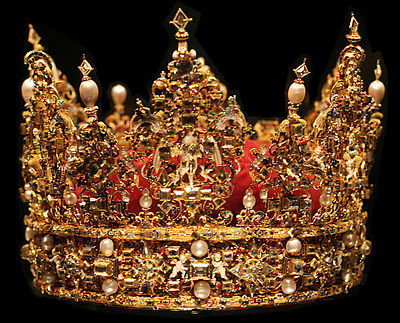
The grand ballroom was packed. It was coronation night and half of Cordonia had turned out to watch.
The other half would be watching from their television sets. News crews were spread out in strategic places throughout the room.
The former crown prince took his place in the audience. A scant few months ago he thought it would be him on that dais, his head that would be receiving the crown, his life that would be dedicated to duty and sacrifice.
He wondered if he had dumped too much responsibility into his younger sibling’s lap, but he knew that, between the two of them, he was the less prepared to rule, the less willing to make the sacrifices that needed to be made.
He had been prepared to rule, yes. He had been raised to rule, yes. But everything changed when he met her.
He’d given up the crown and abdicated his place in the line of succession for love. He glanced down at the woman next to him, his heart swelling with emotion as she smiled up at him.
It had been worth it. He had no regrets.
He stole a quick glance across the room at his brother’s face, thinking about how much they had in common.
On the dais, Cordonia’s next monarch stood next to their father, eyes scanning the room and lighting up when they landed on him. He smiled back encouragingly, quashing the sliver of guilt that remained even though he was confident he had made the best choice for everyone involved.
He knew his father disapproved but what was done was done.
Constantine stepped up to the microphone and started his speech, “Fellow Cordonians, welcome! I’m so pleased to have you all join us for tonight’s historic event! I appreciate your patience; I know this isn’t the Rys you were originally expecting, but this is exactly why royal couples from time immemorial are encouraged to produce spares!”
There was polite laughter from the audience as the two brothers locked eyes across the room remembering how their father had privately accused his children of playing musical chairs with the monarchy.
But the Rys children had made a pact long ago to stand united in the face of their father’s disapproval and they had never wavered from that alliance even into adulthood. The fact that the youngest sibling was standing on the dais instead of the oldest was proof of that.
Constantine finished his speech and Liam tore his eyes away from Leo to watch as their father placed the crown on Lena’s head.
He had willingly stepped up when Leo abdicated for love, and Lena had willingly stepped up when he’d done the same. He glanced down at Riley as he applauded knowing he had made the right choice. He smiled across the room at Leo who stood next to his new wife, Olivia Nevrakis Rys and he whistled and shouted in approval when his sister made her selection and got engaged to Hana Lee.
Their father had little choice after Lena had threatened to also abdicate if not allowed to make her own choice freely. Leo and Liam had backed her up and both had promised to acquiesce to their father’s wishes for them to stay and support the monarchy if she was given that freedom.
All three Rys children had been able to choose love for themselves because all three had loved and supported each other. Together, they had overcome their father’s attempt to control their lives. Together, they would lead Cordonia into a better future.
#trr au#the royal romance#liam rys#leo rys#trr fanfiction#choicesholidays#sibling day#choices fic writers creations#cfwc fics of the week
45 notes
·
View notes
Text
The Demon Slayer Timeline, part 01
[Lots of spoilers for obvious reasons] The Demon Slayer Timeline is actually, a really long one. While it does not follow the totality of the Japanese history, it follows closely the beginning and falling of the Samurai era. While the main plot takes place in the Taisho Era [1912-1924], Sumiyoshi Kamado and Yoriichi Tsugikuni take us to the Sengoku Jidai [1467-1563], and Muzan to the Heian Era [794-1192] ( Muzan drop that skincare routine). But let us start from the beginning.
Muzan says that he was turned into a demon by a doctor in the Heian Era.

The Heian Era [c.794-1192] is today regarded as one of the times of highest culture, even though it was one of the [many] times of political and military conflicts. After conflits between the imperial court and the Buddhist sects that were starting to have way too much power the capital was moved from Nara to Heian-kyo - today known as Kyoto - to be safely way. That said, it also started a religious reform with the introduction of new kinds of Buddhism. [with less interest in power obviously, but still kept at a safe distance of the court] Tendai Buddhism and the Pure land Buddhism would start gain attention during this times and the temples would open their doors to every one of every type of social class [as we can see with Gyomei Himejima, the Rock Hashira that was a blind man that took care of orphan children in a Buddhist temple]. The temples stop having political power, but they also stop having financial aid. So, to survive they had to start exploring the natural resources of their territories. It's not going to take long before the temples start to argue about say territories, and to protect them, they will start to train the farmers that inhabited it, creating what would become a military class. In 'other hand, in the capital we see a court that is way to centred on herself. The Fujiwara clan was the family with the biggest amount of power. Fujiwara women would marry into the Imperial family in a what could be called genetic colonialization. In the 10th century the Imperial household could not function without the Fujiwara one, starting the tradition were until they reached adulthood the emperor had a Fujiwara regent, so basically it was the Fujiwara that ruled not the Imperial family. But, after 170 years, in 1068 an emperor without a Fujiwara mother sits on the chrysanthemum throne. Go-Sanjo would start to eradicate the Fujiwara by abdicating, leaving the throne to his already adult son. And the same would happen for the next 2 emperors. But by starting to cut ties with the Fujiwara, the imperial family cut off his right arm, and the arm that had the military power, nonetheless. Japanese had a natural border against enemies, that also meant that they did not have to where to expand their natural territory. So, without new territories to be conquered, the only solution was to start fighting each other for the lands that existed. The families that lived far from the capital were old families that knew their territories like the palm of their hands. With the crescent responsibilities of safeguarding their territories, like with the temples, this Shoen [local provinces] start to train their inhabitants [just like the temples]. We start to see the conquest of territories, and when a clan was defeated, the warriors would start to serve the winning clan. It's the birth of the Samurai Code. In the 12th century we start to have clans that are ready to go against the imperial court. In 1160 we have the Heiji war, were the Minamoto and Taiga clans are confronting each-other at the capital, and the Taiga family wins, and with entering the court life would become an exact copy of the Fujiwara. The only heir and survivor of the Minamoto clan starts to see the military machine of the Taiga to transform into an aristocratic one wand waits until 1180 to strike back. In 1185 the Minamoto would win the Genpei war staring the 1st ever Shogunate rule.
When Tanjiro goes to the Swordsmith, village, he encounters the mechanical doll made by Kotatsu’s ancestors called “Yoruichii Type Zero” where he goes on saying that that face is familiar to him and Kotatsu says that that technology is from the Sengoku Era.

Then after that we start to see Tanjiro’s flash backs of his ancestor Sumiyoshi Kamado and his encounter with Yoriichi Tsugikuni and all of that is confirmed with the backstory of Upper Moon 01 - Kokushibo.

Now, what was the Sengoku Era? Also known as the “warring states era”, the Sengoku-Jidai [c.1467-1573] was the time where the Japanese archipelago was buried on the total anarchy that was the civil war. So, we have a circa 275 years jump. After the failed rule of the Ashikaga Shogun [Yes because history spoilers, after the Minamoto Shogunate there was more was, more war, and another Shogun], the daimyo [local governors] continue to train their locals to defend their territory. Thanks to the fidelity bonds, the commoners responded to their daimyo, while the daimyo had to respond to the Shogun. Since the Shogun [we don’t even talk about the emperor since he was basically a poppet] no longer protected the daimyos they started to rebel against him saying that he was the first that broke the fidelity law. The commoners, started to learn specific combat techniques - the Kenjutsu, art of the sword - and would develop to what we know call samurai. The word samurai comes from the word “saburau” which means “to serve”, the rising of the samurai class marks the beginning of the feudal era in Japan. At the beginning, these warriors could have two jobs - be warriors and farmers as an example. When Hideyoshi (we will soon talk about him) came to power he required that they choose one or the other, but as long as a samurai remained loyal they were guaranteed a good life. The samurai's weapon of choice was a 2-sword combination. The 1st one, was the combat sword, a long one called (surprise) Katana. The 2nd one was a small curved one called Wakizaki that served to cut one’s stomach (note: important I tell you). Now, while everyone was fighting each other for territory, a man in the middle of the territory started what would soon become the union of Japan. Oda Nobunaga [織田 信長 1534-1582], as the eldest son that everyone thought would not do much. Turns out he collaborated with his uncle to kill his brother, to then kill said uncle. At 25 years old no one was bad mouthing him in Owari anymore. He started then to expand his territories were battle after battle he seemed unstoppable. Then Nobunaga’s troops were defeated for the 1st time, and Akeshi Mitsuhide [明智光秀 1528-1582] would profit this momentarily loss of confidence on Nobunaga to obligate him to commit suicide. But Mitsuhide's victory was short lived since Toyotomi Hideyoshi [豊臣 秀吉 1527-1598], learning what had succeeded rushed to confront Mitsuhide, ending up defeating him. (Man, I love telling everyone this part cause this is what I call plot twist after plot twist! And we aren't finished yet!) Hideyoshi would be de one finishing what Nobunaga started and re-uniting wall the territory under one ruler. But, after Hideyoshi's dead, his son was still a minor (literally a baby). He would go on naming 5 daimyos as regents in case 1 rebelled the other 4 would protect the heir. Still that did not stop Tokugawa Ieyasu [徳川家康 1543-1616] from rebelling. At 1600 Tokugawa would win the legendary Sekigahara battle, and in 1603 he would (not so kindly) ask the emperor for the Shogun title. He would go on to establish the longest Shogunate in Japanese history. So as the saying goes: “Nobunaga oiled the national rice cake, Hideyoshi kneaded the dough and, in the end, Ieyasu at down and gobbled it up”.
Bibliography: CHAPLIN, Danny. 2018- Sengoku Jidai: Nobunaga, Hideyoshi and Ieyasu: the three unifiers of Japan. CreateSpace Independent Publishing Platform. Ebook; CLEMENTS, Jonathan. 2017 - A Brief History of Japan: Samurai, Shogun and Zen. The extraordinary story of the land of the rising sun. Clarendon: Tuttle Publishing.Ebook; HILLSBOROUGH, Romulus. 2017 - Samurai Assassins: "Dark Murder" and the Meiji restoration, 1853-1868. Jefferson: McFarland & Company. Ebook; MANSON, R.H.P ; CAIGER, J.G. 1997 - A History of Japan. Clarendon: Tuttle Publishing, 1997. Ebook;
#demon slayer#demon slayer history#demonslayerfromhistorytofantasy#demon slayer from history to fantasy#japanese history#history#research#history research#kimetsu no yaiba#kamado tanjiro#muzan kibutsuji#sumiyoshi kamado#yoriichi tsugikuni
48 notes
·
View notes